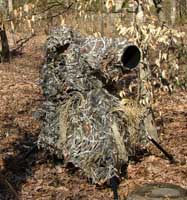 |
|
|
|

Tips For Better Nature Photography
Jump
to the section on...... [ Technique ] [ Equipment ]
|
Introduction:
You might call this section
my "advice" column, although not all this advice necessarily comes directly from
me. Some of it comes from other wildlife photographers who have been at it longer
than I, and consequently have more experience. The rest comes from my own experiences,
expressed in my own words. Either way, the advice given reflects things I have learned
and subscribe to in my own photography.
Please note that because I link to other
websites for some of this information, you may come across broken links when the
sites move things around. Though I will try to keep track of these changes, something
is sure to eventually slip my attention.
TECHNIQUE:
Monopod Technique - I
bought my first monopod specifically to facilitate "hand-holding" of my
500mm lens on those occasions when dragging along a tripod would not be so handy.
My logic was that the monopod would take the weight, and I could otherwise wield
the lens pretty much like hand-holding any other lens. I thought it would be a simple
thing to handle, but I quickly learned it was far more difficult to keep steady than
I expected. Then I found some tips in these two articles.
 |
| Good
Camouflage |
How
to hold a monopod - article 1
How
to hold a monopod - article 2
After trying the various stances
given in these articles, I found which position worked best for me.
Using a monopod
with a long lens
Good
Camouflage in Bird Photography - Each discipline of
photography has it's own needs. Landscape, underwater,
macro, panoramic, architectural, etc., all use special
lenses and equipment you may never need for anything else.
For bird and wildlife photography the art of camouflage
certainly has its place. Any serious wildlife photographers
are eventually going to use some sort of camouflage, even
if it's just a commercial blind. Here are my thoughts
on the hows and whys of camo in my full-page article on....
Choosing and using
good camouflage
The
Field Craft Of Getting Closer To Your Subjects - Though
aimed squarely at bird photography, this article provides
good field craft tips that will help for any animal subject.
Whether shooting from your vehicle, on foot, or from a
small boat, these tips will get you better, closer photos.
Tips On Getting Closer
To Your Subjects (Field Craft)
The
Eyes Have It - The importance of sharply focused,
detailed eyes in your subjects is sometimes overlooked,
even by experienced wildlife photographers. Knowing how
to avoid issues, and how to fix them when they happen
will go a long way toward improving your photos.
The Eyes Have It - That All-important "Spark" In Wildlife Photography
Back-button
Autofocus - The best of all worlds in focusing - If
you're doing wildlife photography and not using back-button
autofocus, then you're doing it the hard way. I'm betting
that if you try it, you'll never go back to shutter button
focus again.
Back-button
Autofocus - The Tip Worth Its Weight In Gold
Wildlife
Photography - What's Your Shooting Style? When you
come across other wildlife photographers in the field,
do you ever take time to watch how they work, or pay attention
to how they're dressed, or take stock of what sort of
equipment they are and aren't using? If you do, then you
may be able to tell something of their personal shooting
style, and your own style, once you've read....
Wildlife Photography - What's Your Shooting Style?
Other Links:
An extensive
list of topics pertaining to digital bird photography is covered in this informative
resource by Bill Majoros -
Secrets of Digital Bird Photography
This
is an interesting web site that discusses how camo patterns
are supposed to work, and shows many commercial camo patterns
to ponder over -
camouflagepatterns.com
This
site has several articles on Ghillie suit "how-to's" that
can be helpful, beginning with -
"How
to Make a Ghillie Suit"
|
| |
|
|
 |
|
 |
